Politics
EFCC And 2011 Polls
Recently, the Economic and Financial Crimes Commission (EFCC) had submitted an advisory list containing names of prominent politicians, former and serving public officers, alleged to have one case or another pending before various courts in the country.
The list contained at least 100 names with 40 prominent politicians whom the commission said should be barred from running for elective offices in the forthcoming 2011 elections.
The EFCC’s intention as speculated, may not be unconnected with a purported pre-emptive measure to stop or dashing the hope of some politicians with ambition to contest election in 2011.
The list had generated furore and negative reactions from prominent citizens in the country. Some believed that EFCC has become political tool in the hands of privileged government officials as instrument of intimidation against perceived political opponents.
The Chief of Staff to the Rivers State Government House, Hon. Nyesom Wike, whose name was conspicuously mentioned said: “it is a political vendetta.
Some citizens also saw the EFCC are institution and instrument poised to witch hunt perceived political opponents that refused to tow their political ideology.
This no doubt was said to be the ugly face of the commission under the erstwhile chairman, Mallam Nuhu Ribadu.
The them EFCC chairman, Mallam Nuhu Ribadu’s similar advisory list caused serious political uproar prior to the 2007 general elections.
The dust generated a number of controversial tendencies with the disqualification of the PDP governorship candidate in Rivers State now incumbent Governor, Rt Hon. Rotimi Chibuike Amaechi, Chief Peter Okocha, Action Congress of Nigeria (ACN) governorship candidate in Delta State and former vice president, Alhaji Abubakar Atiku, among others.
With determination and courage, they fought their cases to the Supreme Court where the Supreme Court judgments gave them victory at the end of the day.
However, the questions agitating the minds of concerned Nigerians are whether the EFCC has such powers to stop any politician from contesting the forthcoming election based on the advisory list?
Will the 64 registered political parties in Nigeria accept the advisory list to act upon it thereof?
Is EFCC now usurping the constitutional functions of the law courts as to stop candidates without any conviction by the court?
However, perusing the law setting up the anti graft agency, the Economic and Financial Crimes Commission (Establishment Act 2004), the EFCC was charged with among others functions, the duties of investigation of all financial crimes including advance fee fraud, money laundering, counterfeiting, illegal charge transfers, future market fraud, fraudulent encashment of negotiable instruments, computer credit card fraud, contract scam etc.
Also, the EFCC shall adopt any measures to identify, trace, freeze, confiscate or seize proceeds derived from terrorist activities, economic and financial crimes related offences or the properties, the value of which corresponds to such proceeds.
Again, EFCC has such function of the examination and investigation of all reported cases of economic and financial crimes with a view to identifying individuals, corporate bodies or groups. From the legal perspective therefore, EFCC was not charged with the responsibility of stopping any candidate from contesting elections or to compile any advisory list to the political parties.
A prominent legal practitioner based in Port Harcourt, Barr. Awanen Jas, said the EFCC lacked the power to advise political parties on whom they should endorse for elections.
The legal luminary added that until a person is convicted by a law court, nobody has the right to stop a person from standing for election.
“EFCC has no powers under the law establishing the anti-graft agency to stop any aspirant”, he declares.
Also speaking to The Tide, an Attorney at law of the OLORI EGBE & Co Port Harcourt law office, Olubisi Mikail Afolabi, Esq, said the political parties should disregard the EFCC’s advisory list as the agency cannot constitute itself unto a court of law to stop any candidate vying for elective position.
Mikail Afolabi added that it is only court of law of competent jurisdiction having found any politician guilty of corruption and upon conviction can such politician be stopped from contesting election and not mere EFCC’s advisory list.
Also speaking to The Tide exclusively, in Port Harcourt, the Chief of staff to the Rivers State Governor and former chairman, Obio/Akpor local government area, Chief Ezebunwo Nyesom Wike, whose name was among the names on the EFCC advisory list faulted the inclusion of his name by the anti-graft agency in the advisory list to the political parties, said that he has no case to answer before the anti-graft agency.
He stated that EFCC should not be a political tool to be used to witch- hunt politicians with integrity and willingness to serve their constituency.
Chief Wike added that EFCC wrongly included his name in the advisory list of politicians having cases pending against them in court.
The Chief of Staff emphasised that the case between him and the EFCC which started in 2008, originating from his arraignment by the EFCC before Abuja High Court and then to the Court of Appeal Abuja, presided over by His Lordship Justice Ayobode Olokulo-Sodipe, where the Appeal Court ruled in his favour by quashing such criminal case against him.
He further explained that from March 2009, when the Court of Appeal discharged and acquitted him of any wrong doing, the EFCC has not appealed against that judgment or any case against him to warrant his name being listed by the commission.
However, a Senior Lecturer at the University of Port Harcourt, Dr Ishmael Guorima, had a contrary opinion. He said the EFCC’s advisory list is timely to the political parties to be careful with certain candidate being considered to be fielded for elective position.
The senior lecturer said the EFCC’s advisory list is a welcome development and a clear departure of the modus operadi of EFCC under Malam Nuhu Ribadu.
He said the list to the political parties is to advise the parties that, “please they should look before they leap in fielding candidates”.
However, the various political parties have the discretionary power to field any candidate they consider as their choice, if such a candidate wins the primaries of the parties.
It is the consensus opinion that EFCC should be guided by law in its operations to avoid being used as political tool thereby defeat the noble objective of its primary responsibilities of fighting corruption.
Philip-Wuwu Okparaji
Politics
Why I Won’t Help Tinubu’s Govt Overcome Economic Challenges – Sanusi
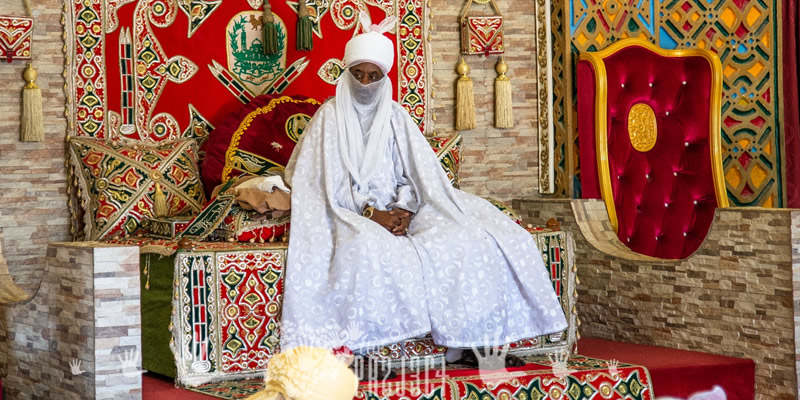
The 16th Emir of Kano, Muhammad Sanusi II, says he would not help President Bola Tinubu’s administration to correct the administration’s policies affecting the citizens.
Emir Sanusi spoke on Wednesday in Lagos as the chairman of the 21st Anniversary of Fawehinmiism (Gani Fawehinmi Annual Lecture 2025).
The emir stated that while there were “a few points” he could offer to explain the trajectory the administration had taken and how such decisions were predictable, he chose not to do so because “they don’t behave like friends.”
He said explaining the government’s policies would help the government, but he did not intend to assist them due to the way they had treated him.
“I can give a few points that are contrary, that explain perhaps what we’re going through and how it was totally predictable, most of it, and maybe avoidable. But I am not going to do that.
“I have chosen not to speak about the economy or the reforms or to even explain anything because if I explain, it would help this government, but I don’t want to help this government,” the emir said while addressing some of the points made by speakers about the economy.
He added: “You know they’re my friends, but if they don’t behave like friends, I don’t behave like a friend. So I watch them being stooges. And they don’t even have people with credibility who can come and explain what they are doing. I am not going to help. I started out helping, but I am not going to help. I am not going to discuss it. Let them come and explain to Nigerians why the policies that are being pursued are being pursued.
“Meanwhile, I’m watching a very nice movie with popcorn in my hands. But I will say one thing: What we are going through today is, at least in part, not totally, but at least in part, a necessary consequence of decades of irresponsible economic management.
“People were told decades ago that if you continue along this path, this is where you’re going to end up, and they refused to open their eyes. Now, is everything being done today correct? No.”
Emir Sanusi, who was deposed as the 14th Emir of Kano in 2020 by then-Governor Abdullahi Umar Ganduje, the current national chairman of the ruling All Progressives Congress (APC), was reinstated as the 16th Emir of Kano in 2024 by the New Nigeria People’s Party-led Kano State Government.
His emirship has faced ongoing challenges from forces believed to be backed by the federal government, including federal officials’ continued recognition of his predecessor, Emir Aminu Ado Bayero.
Last month, the police barricaded his palace, with the state government accusing the federal government of orchestrating the action to stir unrest in the peaceful state.
Politics
Reps Loses Deputy Chief Whip
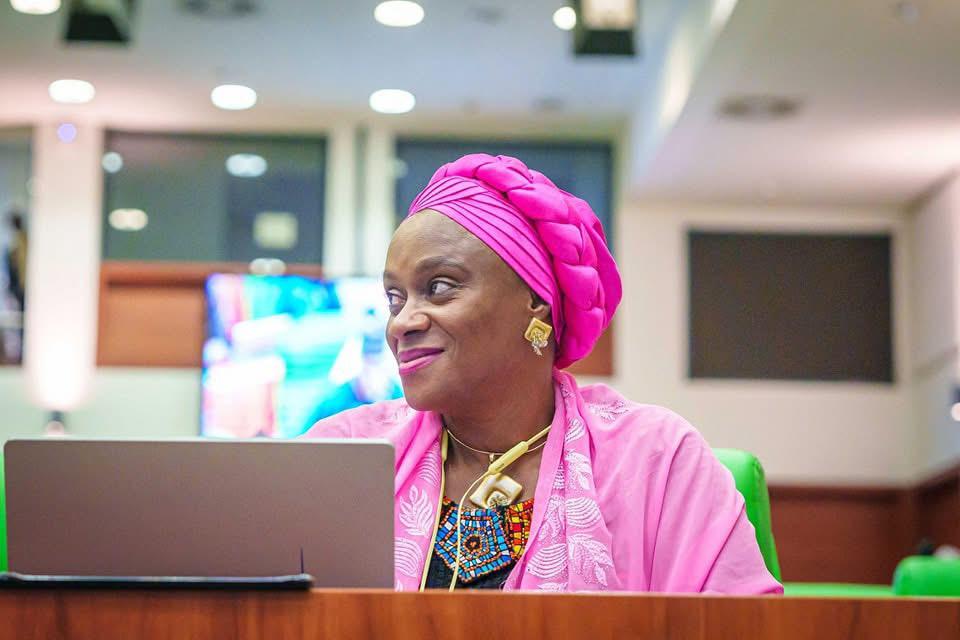
The Deputy Chief Whip of the House of Representatives, Rt Hon. Oriyomi Onanuga, is dead.
Also known as Ijaya, Rt Hon. Onanuga, who was the member representing Ikenne/Sagamu/Remo North Federal Constituency, is said to have died following a brief illness.
This was confirmed in a tweet on the official X (formerly Twitter) account of the House of Representatives, on Wednesday night.
Rt Hon Onanuga, who was born in Hammersmith, London, to Nigerian parents on December 2, 1965, was a politician and entrepreneur. She held the position of Deputy Chief Whip in the Nigerian House of Representatives since 2023.
She contested and won a seat in the House of Representatives under the platform of the All Progressives Congress (APC) in 2019. She also served as the Chairperson of the House Committee on Women Affairs and Social Development.
Politics
Aiyedatiwa Dissolves Cabinet, Retains Finance Commissioner, Attorney-General
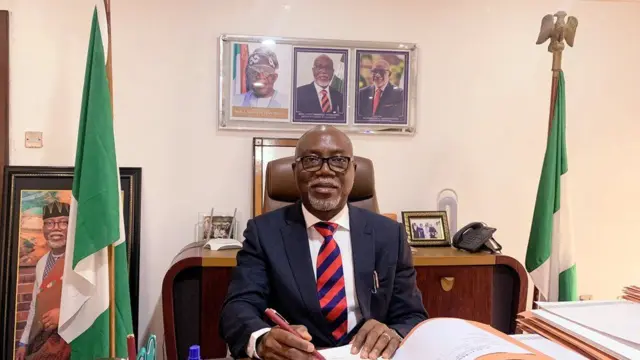
Gov. Aiyedatiwa, however, exempted two members of the cabinet from the dissolution due to the critical nature of their duties.
The two commissioners exempted include the Attorney General and Commissioner for Justice, Dr Kayode Ajulo, SAN, and the Commissioner for Finance, Mrs. Omowunmi Isaac.
This was contained in a statement issued by the governor’s Chief Press Secretary, Ebenezer Adeniyan, in Akure, the Ondo State capital.
Mr Adeniyan said in the statement that “All the affected cabinet members are to hand over all government properties in their care to the accounting officers of their respective ministries.
Gov. Aiyedatiwa thanked the executive council members “for their service and contributions to the development of Ondo State under his administration and wished them well in their future endeavours”.
-
Business4 days ago
Azman Airline Dismisses Aircraft Sale Alegations
-
Sports4 days ago
NNL Fines Sporting Supreme, Kada Warriors FCs Over Unruly Conduct
-
Niger Delta2 days ago
CP Urges Journalists To Verify Information Before Publishing
-
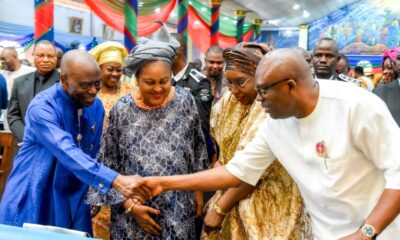
 Featured4 days ago
Featured4 days agoRSG Set For Armed Forces Remembrance Day
-
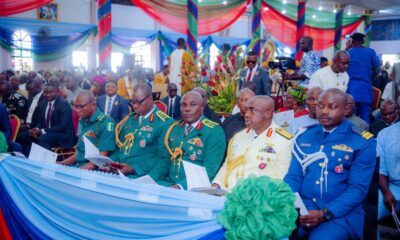
 News4 days ago
News4 days agoAFRD: Let’s Celebrate Gallantry Of Soldiers More While Alive Than In Death -Fubara …As Rivers Honours Fallen Heroes, Members Of Armed Forces With Thanksgiving
-
News2 days ago
RSG Confirms Nine Deaths From Cholera Outbreak
-
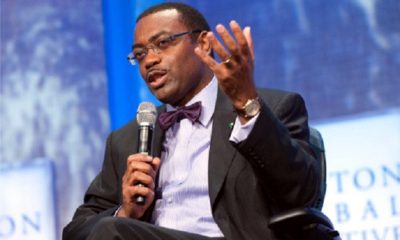
 Business4 days ago
Business4 days agoAfDB, Partners Boost Universal Electrification Efforts
-

 Politics4 days ago
Politics4 days agoSupport For Tinubu: It’s About Good Governance, Not Politics – Oborevwori

